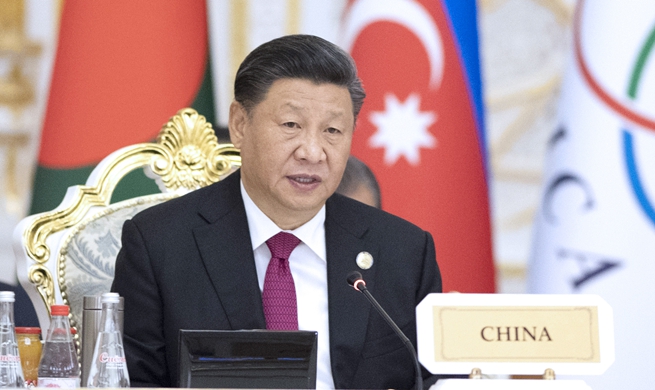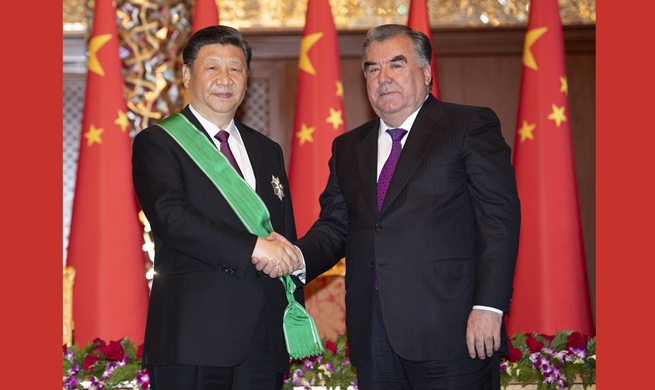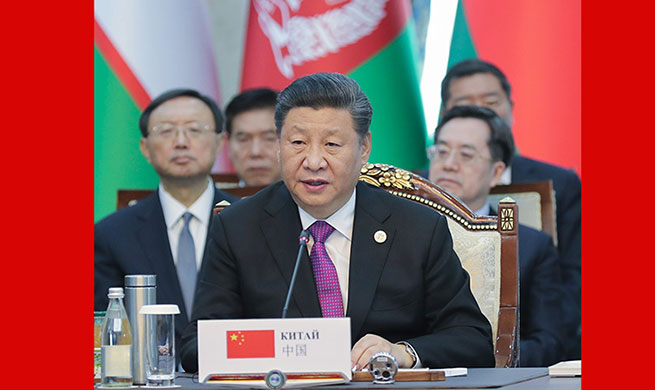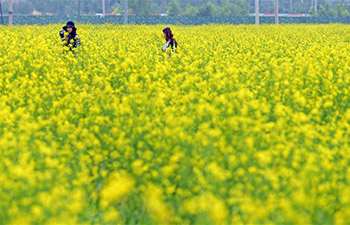KUNMING, June 16 (Xinhua) -- There is a knife hanging on the wall of Zhe Sao's home. It used to be a hunting tool passed down by his ancestors, but now, it has become a decoration, reminding him of the hard times in the past.
Living in Xiaopuxi Village in southwest China's Yunnan Province, Zhe is a Jino, an ethnic group which is the last minority officially recognized in 1979. With a population of around 23,000, the 56th ethnic group of China mainly live in the township of Jino Mountain in Xishuangbanna Dai Autonomous Prefecture.
"My grandpa was born in primitive society, and both my father and I experienced the days of slash-and-burn farming," said Zhe.
The township was located on a tea mountain. Elders told Zhe that there was a severe shortage of commodities before the founding of the People's Republic of China in 1949. "You could only get an embroidery needle in exchange for 50 kg of tea at that time."
Zhe, as well as his minority, have long suffered poverty due to geographical isolation and poor transportation.
"I had my first home when I got married in 2000, which was a tile-roofed house built by bamboo. It was no better than a pen for chickens," said the 46-year-old man, who borrowed 4,000 yuan to hold a wedding ceremony.
A cooking pot, frying pan, kettle and three bowls, "that's all I had," he said.
The rest of the villagers in Xiaopuxi were as poor as Zhe. The 15 households in the township faced food shortages, and children had no access to schools.
Thanks to a series of targeted poverty alleviation policies, Zhe's township and the Jino minority have undergone great changes. More villagers started to accept the commodity economy and walked out of the mountain to integrate into modern society.
As Jino Mountain was one of the six ancient tea mountains where Pu'er tea originated, Zhe cast his eyes over to the tea business.
He cashed in on old tea trees. He built a wooden house in 2005, and two years later, he upgraded the old bamboo house to a brick house of over 100 square meters.
He also helped villagers and encouraged them to join his tea business, teaching them how to make tea and manage tea trees and ultimately increased their incomes.
With the help of the local government, more roads have been built linking the township and the outside world. Tap water and other modern facilities, as well as vocational training, have been introduced to the township over the past few years.
Tea has now become the pillar industry in Xiaopuxi, which is no longer a small and poor place but a renowned tea production base. The tea produced from Jino Mountain Township has been sold to the U.S., Japan and the Republic of Korea.
Residents have become richer, while living standards have also been improved.
Zhe said he is considering installing monitoring equipment on old tea trees so that his clients can monitor the trees in real time.
"I do business through my smartphone," said Zhe, who recently bought Huawei's device, saying the smartphone cost him one kilogram of high-quality tea.
Early in April, the government announced that Jino had been officially lifted out of poverty, together with two other ethnic groups -- the Dulong and Deang.
The total income of Jino Mountain Township increased from 964,000 yuan in 1978 to over 255 million yuan (around 36.8 million U.S. dollars) at the end of 2018. The per capita net income of local residents also grew from 107 yuan to 11,757 yuan, according to Wang Chao, Party chief of the township.
During a recent symposium held in Xishuangbanna to commemorate the 40th anniversary of the recognition of the minority of Jino, the Belt and Road and the China-Laos railway were among hot topics, apart from poverty alleviation and rural vitalization.
"Local residents expect more visitors as a section of the China-Laos railway will open by the end of next year and the station is near the township," said Wang, adding that residents could benefit from the development of tourism in the near future.

















